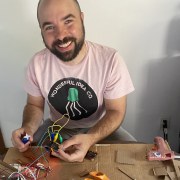Enhancing science learning and awareness through play
How can we design activities for our visitors to play with in ways that encourage science awareness? Thinking about our visitors, what they might be interested in and how that interest can be fed is crucial to the development of such activities that are not restricted to young children, as older siblings and adults are key drivers for younger visitors to engage in play and keep on engaging past the point where they might want to give up.
In this session, three science centres will share the challenges, limitations and opportunities they encountered in developing science activities based on play. Come and experience the “Miniverse” exhibition developed by Experimentarium for young children between the ages of 1 and 5 and “their grown-ups” and engage in activities hosted by the Tinkering Studio at Exploratorium (USA) and Eureka (UK).
Facilitator
Programme Manager - International Relations and Learning
Session speakers
Freiburg im Breisgau
Germany
Ryan Jenkins works to help science centers, museums and makerspaces develop playful exhibits and environments. He will share reflections on designing professional development workshops to train facilitators, investigating high and low tech materials in unfamiliar ways and inviting visitors to participate in a light-hearted prototyping process.
Concept and exhibition developer
Henrik Helsgaun was part of the exhibition development team on Experimentarium’s Miniverse exhibition. The target group is young children between the age of 1 and 5 and their grown-ups. Henrik will talk about the importance of developing the space around and in the exhibition as well as the scenarios and the atmosphere.
One of the main design parameters was the use of nudging through space and physical objects as means of communication and guidance for these very young visitors and their grown-ups. Creating a safe and relaxed environment has been a core element of the requirements to the exhibition.
Henrik will guide you through the why's and what's throughout the exhibition.
Eureka! has embarked on a journey into the world of digital sci-art installations which engage children and young people in a learning experience which involves play, creativity, science and art. The Spark Gallery is a flexible space which hosts a changing program of interactive digital art exhibits. In this session participants will explore this playful technology and how it can be used in a range of settings to enhance learning and discovery.




